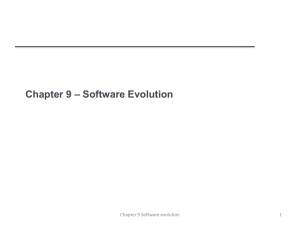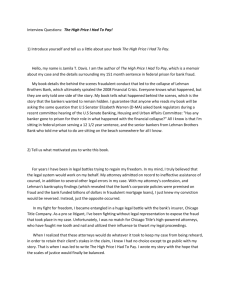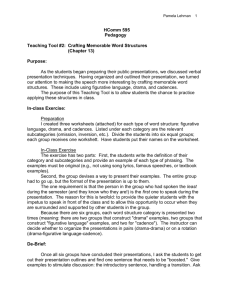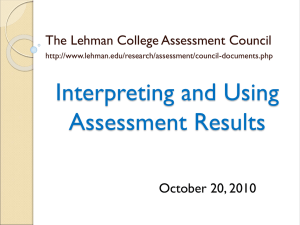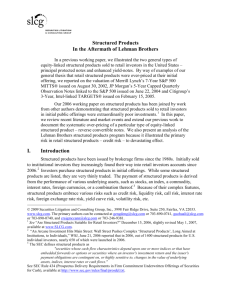Lehman Shock - Different Ways of Writing about Issues
advertisement
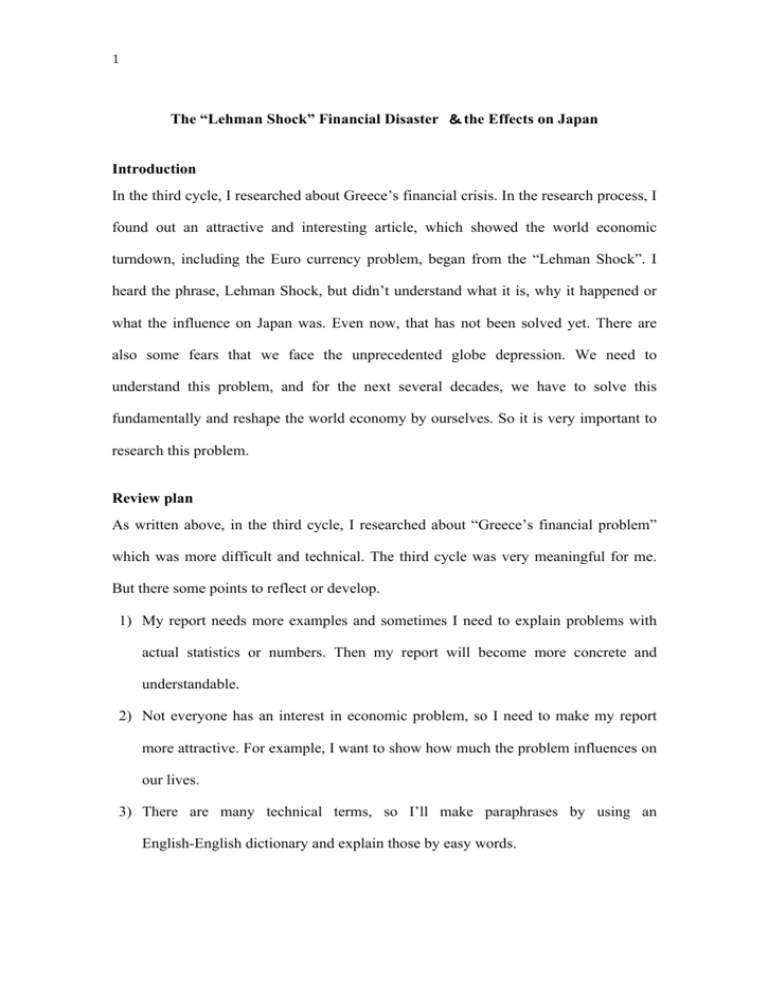
1 The “Lehman Shock” Financial Disaster the Effects on Japan Introduction In the third cycle, I researched about Greece’s financial crisis. In the research process, I found out an attractive and interesting article, which showed the world economic turndown, including the Euro currency problem, began from the “Lehman Shock”. I heard the phrase, Lehman Shock, but didn’t understand what it is, why it happened or what the influence on Japan was. Even now, that has not been solved yet. There are also some fears that we face the unprecedented globe depression. We need to understand this problem, and for the next several decades, we have to solve this fundamentally and reshape the world economy by ourselves. So it is very important to research this problem. Review plan As written above, in the third cycle, I researched about “Greece’s financial problem” which was more difficult and technical. The third cycle was very meaningful for me. But there some points to reflect or develop. 1) My report needs more examples and sometimes I need to explain problems with actual statistics or numbers. Then my report will become more concrete and understandable. 2) Not everyone has an interest in economic problem, so I need to make my report more attractive. For example, I want to show how much the problem influences on our lives. 3) There are many technical terms, so I’ll make paraphrases by using an English-English dictionary and explain those by easy words. 2 My starting questions 1) What is the Lehman Shock? 2) Why did it happen? 3) What was the influence of the Lehman Shock In this report I will first explain you what the “Lehman Shock” is, why it happened and what “subprime loan” is. That is the key to understanding this problem. Background In this part, I will explain what the “Lehman Shock” is. The Lehman shock refers to failures of Lehman Brothers, the subsequent stock price crash, etc. used as the trigger of the international monetary crisis. Before I tell you why it happened, I need to explain what sub-prime lending is. I think you may have heard it on TV news and in the mass media. Sub-prime lending is making loans to people who may have some difficulties in their repayment schedules. These loans are characterized by higher interest rate and less helpful terms in order to compensate for their higher credit risks. People borrow money from banks to buy houses. These loans for buying property are called ‘mortgages’ (the money that you borrow from a bank to buy a property). When the bank gives you a loan it also gives you a ‘credit rating’. A credit rating is a judgment made by a bank about how safe it is to lend money to you. Sub-prime loans are loans lent by people, whose credit ratings are not good. When you return money to a bank, you also must pay “interest rate”. An interest rate is how much extra money you must pay when you pay back. As written above, people borrowing sub-prime loans are given low interest rating, so they have more risks that they can’t pay back. In order to compensate for low interest rating, they must take higher interest rate, in other words, they must pay more extra money when they pay back. 3 Next I explain the “sub-prime crisis” ,which was a main factor of Lehman Brothers’ bankruptcy. Many lenders were more positive in accepting sub-prime loans during the boom from 2004 to 2006 (Investopedia 30th November 2011). They initially lend money in lower interest rate, but through these higher risk loans, lenders sought additional profits and, in order to compensate for the additional risk, they raised interest rates. This is one factor in the sharp increase in the number of sub-prime mortgage foreclosure. Foreclosure means bank or mortgage lender taking control of a person’s property because they cannot pay back money that they borrowed to buy it. When foreclosure happens, a person loses their house and possessions and they must move out their home Owing to the increase of foreclosures, consequently, many lenders (including Lehman) experienced financial difficulties and even bankruptcy. Lehman was the fourth biggest investment bank in USA. It borrowed large amounts of money to fund its investing, which led to its bankruptcy in 2008. A big part of this investing was mortgage market. Lehman brothers could generate tremendous profits during the boom of mortgage market and prosperous time. However as I said above, the sub-prime crisis occurred. Investment banks such as Lehman were not ready for these changes. In 2008, Lehman faced an unexpected loss due to the happening sub-prime mortgage crisis. Lehman’s loss was a result of holding too much of sub-prime and other low rated bonds. The loss resulted in more than 8billion dollars (BBC 16th September 2008). The value of its stock decreased 73 percent. Lehman lost their confidences of stockholders and investors. Finally Lehman Brothers collapsed on 15th September 2008. Effects on Japan After the Lehman shock, not only the USA but also Japan and Europe suffered from 4 big impacts. Even now the Japanese economy isn’t good. I researched how bad the condition of Japan was after the shock. After the shock, many individual countries went into recession and world economy has become worse and worse. Japanese industries were heavily damaged by the Shock. Japanese economy depends on exports, mainly to the USA. Many Americans could not afford to buy Japanese products, for example, automobiles and TVs. Moreover the confidence of US dollar was lost. this means Japanese yen became stronger. This also disturbed Japanese exports. Next I consider similarities and differences between USA and how Japanese society change after the Shock. In the USA a lot of employers have dropped health coverage of insurance for employees, and their costs for private health programs are beyond the budget of many workers. Meanwhile in Japan, nation’s universal health coverage is more wide-spread than that of the USA. But, there are some similarities between Japan and the USA. The US poverty rate is 15.1%, and Japan’s is more than 16%. And the percentage of people holding non regular jobs is at its highest level ever -38.7% (Japan times 4th December 2011). Moreover, in Japan, wages drop significantly between 2007~10, according to surveys by “Keidanren”. For example, the average of annual salary of men in their 50s decreased ¥5.58million in 2007 to 4.81 million in 2010 (Japan time 4th December 2011). Meanwhile, the number of individuals belonging to the wealthy segment has continued to climb steadily since 2001. So Japan is becoming a society with a widening income gap and low wage society. The Lehman shock is a very difficult problem. It occurred in USA, but its impact has spread all over the world. If some countries will overcome this situation, it not may be a fundamental solution. We have not come up with a fundamental solution yet. This is the challenge for us. We must study and analyze this problem and rebuild world 5 economic mechanisms. In the fourth cycle, I had many troubles in picking out articles about Lehman Shock from a lot of web-sites. Almost all of these articles were very difficult discourses or theories for business people. So these articles were really difficult for a an undergraduate like me to understand, but, I read some articles about same theme in order to catch contents and, since my teacher, Andy told me other some articles, so somewhat I could carry out my research. I want to learn more technical knowledge and develop my English skill, and I hope to be able to read those articles in the future. Finally from my research, these issues are important to research further in order to understand the effects of the Lehman Shock in more depth: 1) What should Japan do to rebuild its economy? 2) In what ways will the US economy recover from the “Lehman Shock”? 3) What the “sound economic condition” can we create in the current economic system? References Bankruptcy of Lehman Brothers, Wikipedia, 26th November 2011. 30th November 2011 http://en.wikipedia.org/wiki/Bankruptcy_of_Lehman_Brothers Occupy Wall Street resonates within Japan, the Japan times, December 4th 2011. 10th December 2011 http://www.japantimes.co.jp/text/fd20111204bj.html Subprime Lending, Wikipedia, November 8th 2011. 30th November 2011 http://en.wikipedia.org/wiki/Subprime_lending Q and A Lehman Brothers bank collapse, BBC, 16th September 2008. 30th November 2011 http://news.bbc.co.uk/2/hi/7615974.stm What is a subprime mortgage? ,Investopedia, 30th November 2011 http://www.investopedia.com/ask/answers/07/subprime-mortgage.asp#axzz1h8X7Y NP5


